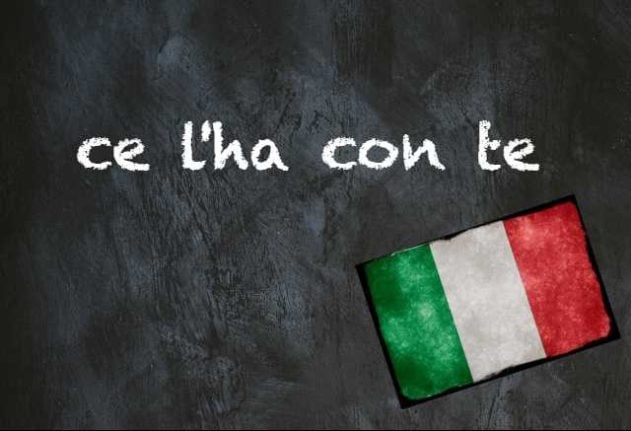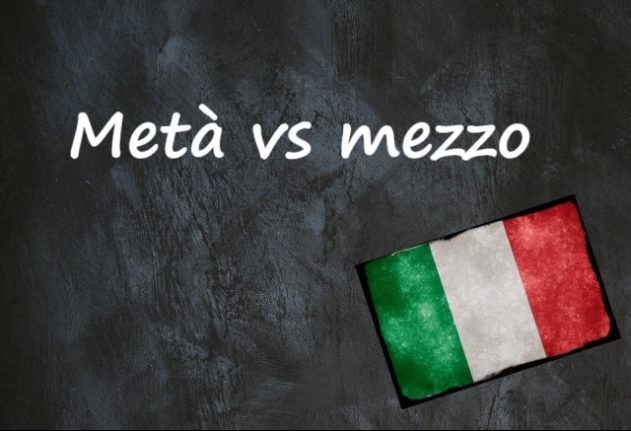If you ask an Italian why your mutual friend has stopped responding to your texts, you might be told “è arrabbiata con te” (she’s angry with you).
But if you’re having a spoken conversation, you’re more likely to hear “ce l’ha con te“: a more colloquial way of saying “s/he’s mad at you”.
To understand how this phrase works, you’ll need to get to grips with pronominal verbs (verbs with pronouns added on), a form which isn’t usually studied much in Italian class until you’re at a higher level.
The important thing to know about this phrase is that it comes from the pronominal verb avercela, formed of avere (to have) and the pronouns ce la.
Verbs like this aren’t uncommon in Italian: you might see them most often with farcela, which is the base form of the phrase ce la faccio (I can manage).
There’s no direct English translation for each individual component of avercela, so it’s best to avoid thinking too hard about exactly what the ce la stands for.
If you want an English equivalent for avere when talking about being angry with someone though, you can see that in phrases like ‘to have had it with someone’, or ‘to have it in for someone’.
Tua madre ce l’avrà con me se non torniamo prima del coprifuoco.
You’re mum’s going to have it in for me if we don’t get back before curfew.
Sara non mi ha invitata alla sua festa, non so proprio perché ce l’ha con me.
Sara didn’t invite me to her party, I have no idea why she doesn’t like me.
When conjugating avercela, the important thing to remember is that the ce la stays the same regardless of whether the sentence subject is io/tu/lui/lei/noi/loro.
The only change you’ll see is that in almost every context the la is elided into an l’ as it’s followed by whichever form of avere is being used.
It’s also important to note that in the perfect tense, the past particle needs to agree with the feminine la, so avere becomes avuta (not avuto).
Gabriella ce l’ha avuta con me da quando sono tornato.
Gabriella’s had it in for me since I got back.
Ce l’hanno avuta con Laura dal primo momento.
They took against Laura from the very start.
Avercela is similar to, but subtly different from, prendersela (another pronominal verb).
While avercela con qualcuno means you’re harbouring resentment towards someone, prendersela (coming from the verb prendere, to take) con qualcuno means you’ve ‘taken offence’ at or ‘taken umbrage’ at someone for something they’ve just done.
It’s more of an immediate reaction to a specific occurrence, as opposed to a more deep-rooted dislike or grudge.
Perché te la prendi con me, non sono stata io a perdere le chiavi!
What are you yelling at me for, I wasn’t the one who lost the keys!
Se la prenderà con Alessandra se riporti la sua macchina in cattive condizioni.
She’ll blame Alessandra if you return her car in a bad condition.
Here, the se is a reflexive pronoun, so the se la does change to me la/te la/se la/ce la/se la depending on whether the subject is io/tu/lui/lei/noi/loro.
When using the phrase in the perfect tense, prendersela takes essere as its auxiliary verb; and again, the past participle needs to agree with the feminine la, so is presa rather than preso.
Scusa se me la sono presa con te prima.
Sorry I snapped at you earlier.
Hai fallito l’esame e te la sei presa con lei.
You failed the exam and you took it out on her.
The grammar may be a lot to wrap your head around at first, but with some practice you’ll soon be able to sound off about that in-law who just doesn’t seem to like you.
Do you have an Italian word you’d like us to feature? If so, please email us with your suggestion.
Don’t miss any of our Italian words and expressions of the day by downloading our new app (available on Apple and Android) and then selecting the Italian Word of the Day in your Notification options via the User button.



 Please whitelist us to continue reading.
Please whitelist us to continue reading.
Member comments